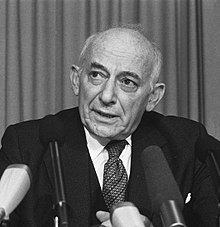Eugene V. Rostow
| Eugene V. Rostow | |
|---|---|

Eugene Rostow in 1981
|
|
| Under Secretary of State for Political Affairs | |
|
In office October 14, 1966 – January 20, 1969 |
|
| President | Lyndon B. Johnson |
| Preceded by | W. Averell Harriman |
| Succeeded by | U. Alexis Johnson |
| Director of the Arms Control and Disarmament Agency | |
|
In office 1981–1983 |
|
| President | Ronald Reagan |
| Preceded by | Ralph Earle |
| Succeeded by | Kenneth Adelman |
| Personal details | |
| Born |
August 25, 1913 Brooklyn, New York |
| Died | November 25, 2002 (aged 89) |
| Spouse(s) | Edna Greenberg |
| Alma mater | Yale College, Cambridge University, Yale Law School |
Eugene V. (Victor Debs) Rostow (August 25, 1913 – November 25, 2002) was an American legal scholar and public servant. He was Dean of Yale Law School and served as Under Secretary of State for Political Affairs under President Lyndon B. Johnson.
Rostow was born in Brooklyn, New York, a grandson of poor Jewish immigrants from the Russian Empire, and raised in Irvington, New Jersey, and New Haven, Connecticut. His parents were active socialists and their three sons, Eugene, Ralph, and Walt, were named after Eugene V. Debs, Ralph Waldo Emerson, and Walt Whitman.
Rostow attended New Haven High School and was admitted to Yale College in 1929. At the time, his scores on his entrance examinations were so high that The New York Times called him the first "perfect freshman". In 1931 he earned Phi Beta Kappa, and in 1933 he earned a B.A., graduating with highest honors, and receiving the Alpheus Henry Snow Prize, which is awarded annually to that senior who, through the combination of intellectual achievement, character and personality, shall be adjudged by the faculty to have done the most for Yale by inspiring in his classmates an admiration and love for the best traditions of high scholarship. He became a member of Alpha Delta Phi.
From 1933 to 1934 Rostow studied economics at Cambridge University (where he would return in 1959 as the Pitt Professor of American History and Institutions) as a Henry Fellow. He then returned to Yale, attending Yale Law School, and earning his LL.B. with highest honors. From 1936 to 1937 he served as editor-in-chief of the Yale Law Journal.
...
Wikipedia
